Related Research Articles

Samoa, officially the Independent State of Samoa and until 1997 known as Western Samoa, is a Polynesian island country consisting of two main islands ; two smaller, inhabited islands ; and several smaller, uninhabited islands, including the Aleipata Islands. Samoa is located 64 km (40 mi) west of American Samoa, 889 km (552 mi) northeast of Tonga, 1,152 km (716 mi) northeast of Fiji, 483 km (300 mi) east of Wallis and Futuna, 1,151 km (715 mi) southeast of Tuvalu, 519 km (322 mi) south of Tokelau, 4,190 km (2,600 mi) southwest of Hawaii, and 610 km (380 mi) northwest of Niue. The capital and largest city is Apia. The Lapita people discovered and settled the Samoan Islands around 3,500 years ago. They developed a Samoan language and Samoan cultural identity.
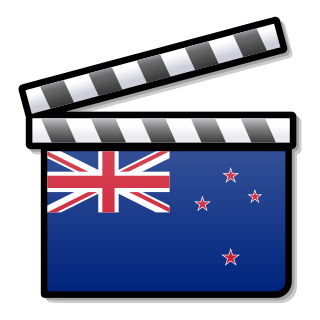
New Zealand cinema can refer to films made by New Zealand-based production companies in New Zealand. However, it may also refer to films made about New Zealand by filmmakers from other countries. Due to the comparatively small size of its film industry, New Zealand produces many films that are co-financed by overseas companies.

The Cannes Film Festival, until 2003 called the International Film Festival, is an annual film festival held in Cannes, France, which previews new films of all genres, including documentaries, from all around the world. Founded in 1946, the invitation-only festival is held annually at the Palais des Festivals et des Congrès. The festival was formally accredited by the FIAPF in 1951.

The Toronto International Film Festival is one of the most prestigious and largest publicly attended film festivals in the world, founded in 1976 and taking place each September. It is also a permanent destination for film culture operating out of the TIFF Lightbox cultural centre, located in Downtown Toronto.
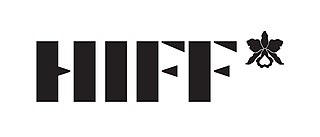
The Hawai'i International Film Festival (HIFF) is an annual film festival held in the United States state of Hawaii.

The Da Vinci Code is a 2006 mystery thriller film directed by Ron Howard, written by Akiva Goldsman, and based on Dan Brown's 2003 novel of the same name. The first in the Robert Langdon film series, the film stars Tom Hanks, Audrey Tautou, Ian McKellen, Alfred Molina, Jürgen Prochnow, Jean Reno and Paul Bettany. In the film, Robert Langdon, a professor of religious symbology from Harvard University, is the prime suspect in the grisly and unusual murder of Louvre curator Jacques Saunière. On the body, the police find a disconcerting cipher and start an investigation. Langdon escapes with the assistance of police cryptologist Sophie Neveu, and they begin a quest for the legendary Holy Grail. A noted British Grail historian, Sir Leigh Teabing, tells them that the actual Holy Grail is explicitly encoded in Leonardo da Vinci's wall painting, The Last Supper. Also searching for the Grail is a secret cabal within Opus Dei, an actual prelature of the Holy See, who wish to keep the true Grail a secret to prevent the destruction of Christianity.
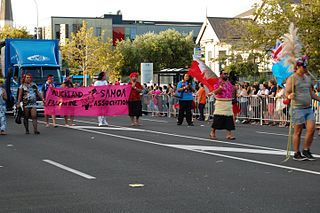
Faʻafafine are people who identify themselves as having a third gender or non-binary role in Samoa, American Samoa and the Samoan diaspora. A recognised gender identity/gender role in traditional Samoan society, and an integral part of Samoan culture, faʻafafine are assigned male at birth, and explicitly embody both masculine and feminine gender traits in a way unique to Polynesia. Their behaviour typically ranges from extravagantly feminine to conventionally masculine.

The Da Vinci Code is a 2003 mystery thriller novel by Dan Brown. It is Brown's second novel to include the character Robert Langdon: the first was his 2000 novel Angels & Demons. The Da Vinci Code follows symbologist Robert Langdon and cryptologist Sophie Neveu after a murder in the Louvre Museum in Paris causes them to become involved in a battle between the Priory of Sion and Opus Dei over the possibility of Jesus Christ and Mary Magdalene having had a child together.
The United States Department of State Country Report on Human Rights Practices in Samoa states that:
The law provides for freedom of speech and of the press, and the government generally respected these rights in practice and did not restrict academic freedom or the Internet. In general the independent media were active and expressed a wide variety of views without restriction. The law stipulates imprisonment for any journalist who refuses to reveal a confidential source despite the issuance of a court order upon request from any member of the public at large. However, there has been no court case invoking this law.
The Da Vinci Code is a 2006 American mystery-thriller film directed by Ron Howard. The screenplay was written by Akiva Goldsman and based on Dan Brown's worldwide bestselling 2003 novel, The Da Vinci Code. It was produced by Howard with John Calley and Brian Grazer and released by Columbia Pictures in the United States on May 19, 2006.

Angels & Demons is a 2009 American mystery thriller film directed by Ron Howard and written by Akiva Goldsman and David Koepp, based on Dan Brown's 2000 novel of the same title. It is the sequel to the 2006 film The Da Vinci Code, also directed by Howard, and the second installment in the Robert Langdon film series. However, the novel version was published before The Da Vinci Code novel. Filming took place in Rome, Italy, and the Sony Pictures Studios in Culver City, California. Tom Hanks reprises his role as Professor Robert Langdon, while Ayelet Zurer stars as Dr. Vittoria Vetra, a CERN scientist joining Langdon in the quest to recover a missing vial of antimatter from a mysterious Illuminati terrorist. Producer Brian Grazer, composer Hans Zimmer and screenwriter Akiva Goldsman also return, with David Koepp coming on board to help the latter.

The São Paulo International Film Festival, also known internationally as Mostra, is an annual film festival held in the city of São Paulo, Brazil. A non-profit event, the festival is organized by ABMIC. The state and city of São Paulo have established October as the festival's official month.

The cinema of Saudi Arabia is a fairly small industry that only produces a few feature films and documentaries every year. Theaters were closed after religious activism in the 1980s. With the exception of one IMAX theater in Khobar, there were no cinemas in Saudi Arabia from 1983 to 2018, although there was occasionally talk of opening movie theaters, and in 2008 conference rooms were rented to show the comedy Mennahi. Saudis wishing to watch films have done so via satellite, DVD, or video. Cinemas were banned for 35 years until the first cinema in Saudi Arabia opened on 18 April 2018 in Riyadh. AMC Theatres planned to open up to 40 cinemas in some 15 Saudi cities over the following five years. The government hopes that by 2030, Saudi Arabia will have more than 300 theaters with over 2,000 movie screens. Cinema of Saudi Arabia, whether locally-produced or foreign-sourced, is subject to Saudi censorship.
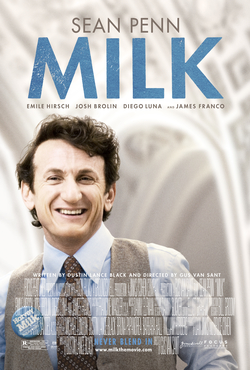
Milk is a 2008 American biographical drama film based on the life of gay rights activist and politician Harvey Milk, who was the first openly gay man to be elected to public office in California, as a member of the San Francisco Board of Supervisors. Directed by Gus Van Sant and written by Dustin Lance Black, the film stars Sean Penn as Milk, Josh Brolin as Dan White, a city supervisor, and Victor Garber as San Francisco Mayor George Moscone.
Maposua Rudolf Keil was a Samoan businessman and owner of the Radio Polynesia 98FM radio station. In 1997 it was one of the only radio stations in Western Samoa that were independently owned. He is also the owner of the Majik Cinema in Apia, and in 2007 along with fellow promoters, the Hon Peter Paul, the Hon Sala Ulugia Suivai and the Hon Polataivao Fosi Schmidt, was one of 10 recipients of the Samoa International Pro-Am Boxing Honorary Awards. In 2003 he received a recommendation from Samoa's Ministry of health for his "Significant contribution by broadcasting the proceedings of the symposium free of charge".
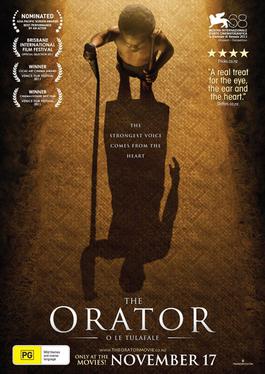
The Orator is a 2011 Samoan and New Zealand film written and directed by Tusi Tamasese. It is the first ever Samoan feature film, "entirely shot in Samoa, in the Samoan language, with a Samoan cast and story". The film was selected as the New Zealand entry for the Best Foreign Language Film at the 84th Academy Awards, but it did not make the final shortlist. It is the first time New Zealand has submitted a film in this category.
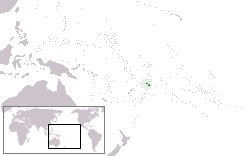
Lesbian, gay, bisexual, and transgender (LGBT) people in Samoa face legal challenges not faced by non-LGBT residents. Sexual contact between men is illegal; punishable by up to seven years imprisonment, but the law is not enforced.
Tusi Tamasese is a Samoan New Zealander film director.

The DaVinci International Film Festival(DIFF) is held annually in Los Angeles, California and is produced by the non-profit DaVinci Film Foundation Inc. The festival hosts four signature programs including their screenwriting competition series, Storyline, presented by Final Draft, DaVinci Labs, which honors burgeoning filmmakers with screenings and scholarships formally held at The Kennedy Center in Washington DC, sponsored by Coca-Cola, a GENiUS program for ultra-short cinema, and documentaries at DIFFdocs.
References
- ↑ "First ever Samoan film wraps up". Television New Zealand . 22 January 2011. Archived from the original on 24 January 2011. Retrieved 4 December 2023.
- ↑ "Samoan Feature Film First" (Press release). New Zealand Ministry for Culture and Heritage. 11 October 2010. Archived from the original on 29 October 2013.
- ↑ "Samoa bans 'Milk' film". ABC Radio Australia. 30 April 2009. Archived from the original on 19 February 2012.
- ↑ "Samoa's government censor bans Da Vinci Code film". RNZ. 21 May 2006. Retrieved 7 December 2023.
